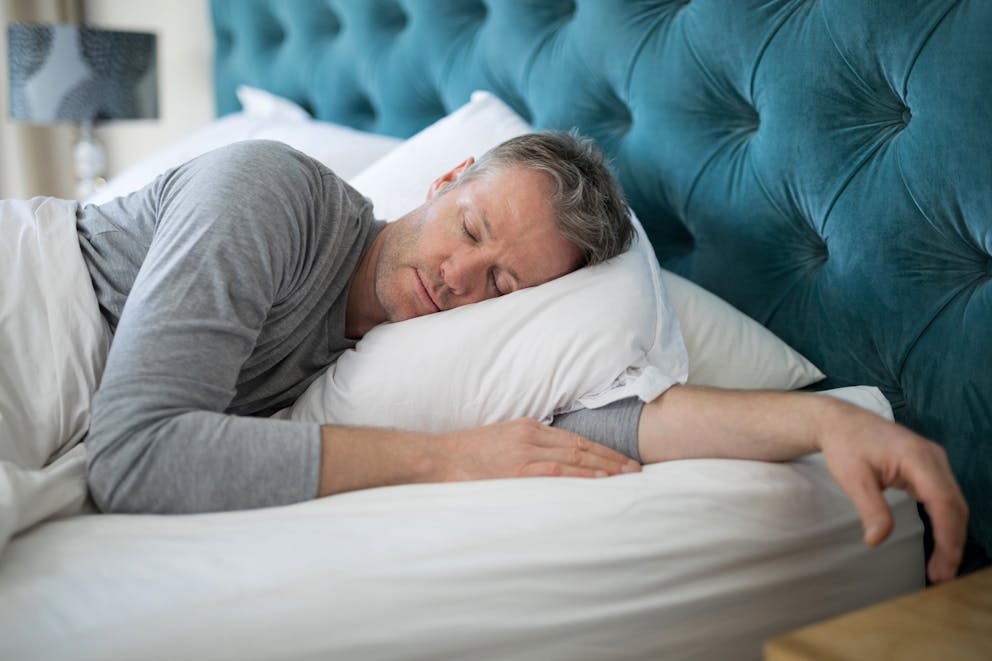If You're Tired But Can't Fall Asleep, This Video is for You!
Think of mitochondria as the unsung heroes in our quest for a good night's sleep, working overtime to keep us rejuvenated. These tiny cellular powerhouses are essential, especially when we consider that the heart and brain—our vital organs—are chock-full of them.
Now, let’s get down to business. I'm about to share some gold nuggets on how you can take your slumber game up a notch. You'll learn why lacing up those sneakers could lead you straight into dreamland faster than counting sheep ever will.
We’ll also dive into oxygenation tactics that turn your bedroom into a restful haven, sync up with Mother Nature's clock for peak zzz’s, and eat right to beat the midnight munchies keeping you awake.
Plus, I’ve got insider tips on crafting an oasis perfect for shut-eye and tackling jet lag like a pro. So buckle up; by the end of this ride, tossing and turning will be old news!
The Role of Mitochondria in Sleep Quality
These tiny structures within our cells work tirelessly to generate energy, which is crucial for a restful night. They're particularly abundant in the heart and brain — organs that play leading roles when we hit the hay.
Exercise as a Pathway to Enhanced Sleep
We all know exercise is good for us, but did you know it's also an ally to your mitochondria? Physical activity boosts oxygen intake, which these cellular dynamos love.
More oxygen means more energy and, ultimately, better sleep quality. It’s like upgrading from dial-up internet to high-speed fiber; everything works faster.
A brisk walk or a quick jog can do wonders for your muscles and set up your inner biology for stellar shut-eye. Those energized mitochondria help regulate the biological functions necessary for sound slumber.
Oxygenation Strategies for Better Sleep
Have you ever wondered why fresh air can make you feel rejuvenated? That's because oxygen is like high-octane fuel for our body's cells, especially the mitochondria.
These tiny powerhouses use oxygen to create energy that keeps us ticking — and when it comes to sleep, they're working overtime.
The Benefits of Open Windows and Indoor Plants
Cranking open a window at night could do more than excellent down your room; it invites higher oxygen levels, which may lead to better rest. And let’s not forget about indoor plants.
They’re decorative and functional allies in upping the O2 ante in your bedroom sanctuary.
Fancy a green thumb challenge? Consider adding some leafy friends to your nighttime oasis. They will pump out extra oxygen while you sleep and add a touch of serene natural vibes to any space.
Nutritional Supplements to Boost Oxygenation
If opening windows or tending plants isn't quite your style, certain supplements might be up your alley.
Coenzyme Q10 acts like an ignition switch for mitochondria, helping them convert nutrients into precious energy — and yes, this includes ensuring there's enough juice for quality Zs.
Methylene blue has been on scientists' radars since who-knows-when as another potential way to ramp up brainpower by enhancing how effectively we use life-giving O2.
Popping these supplements could be one small step towards conquering those elusive eight hours each night.
Synchronizing Your Circadian Rhythm
Imagine your body as a finely tuned orchestra, with the suprachiasmatic nucleus conducting the symphony of sleep-wake cycles. Like musicians rely on sheet music to stay in sync, our internal clock depends on natural light and darkness cues.
Let's shine some light on how you can orchestrate better sleep.
Dimming Lights to Mimic Sunset
Gone are the days when sunset meant it was time to wind down. Today's artificial lighting keeps our environments bright well into the night. But here's a pro tip: dim those lights as evening approaches.
It’s not just about setting a mood; it signals your brain that bedtime is near and supports your natural sleep cycle without uttering a word.
You might also want to swap out those LEDs for incandescent bulbs after dark—they're less disruptive than their energy-efficient counterparts.
The Impact of Blue Light on Melatonin Production
Ever notice how staring at screens before bed leaves you tossing and turning? That pesky blue light from electronic devices does more than keep us engaged—it messes with melatonin production, robbing us of restful nights.
So consider unplugging earlier or switching device settings if counting sheep isn't cutting it.

Dietary Considerations for Improved Sleep
Ever tried to sleep with a rumbling stomach or after a late-night pizza? Not so easy, right? Timing your meals can play a symphony conductor to your circadian rhythms.
Eating earlier in the day aligns with our natural biological clocks and supports better z's at night.
Timing Meals for Circadian Harmony
Eating too close to bedtime can be like throwing a wrench into the gears of your internal clock. It's all about harmony, folks. Your body isn't looking for a midnight snack; it craves consistency.
Research suggests you're more likely to catch those restorative waves of slumber without interruption when you dine early.
We've all been there—waking up at 3 AM feeling wide-eyed and frustrated. This nighttime awakening could signal something off-kilter in the diet department. Perhaps it's adrenal stress knocking on your door or insulin resistance trying to crash the party.
Nutrient Deficiencies Linked to Sleep Disruptions
Your nightly wake-up calls might also be due to nutrient deficiencies playing hide-and-seek in your body. You need an array of vitamins and minerals acting as guardians of sleep, ensuring nothing disturbs those precious hours when every cell rejuvenates itself.
A lack of critical nutrients has been tied directly back home where they belong—in bed.

Optimizing Your Sleep Environment
You know that feeling when you sink into a bed in a perfectly chilled room, and everything feels right? That's not just comfort; it's science working to give you the best sleep possible. A calm, quiet, and dark environment is vital for uninterrupted rest.
So, what can you do to create this ideal sleep haven?
Setting the Stage for Deep Sleep
To kick things off, let’s talk about temperature control. Ever tried sleeping during a heatwave with no AC? Not fun or particularly restful.
Research suggests that your bedroom should be cool—around 60-67 degrees Fahrenheit—to help lower your body temperature and signal your brain that it's time to hit the hay.
Noise reduction plays its part, too, because even though some claim they can sleep through anything—a marching band could parade by their window—it doesn't mean they're getting quality Zs.
White noise machines or earplugs might be worth considering if peace is hard to come by.
Last but not least, invest in comfortable bedding that makes every night feel like an escape into coziness without causing overheating throughout those precious hours of slumber.
Strategies for Dealing with Jet Lag and Bedtime Variability
Jet lag can turn a dream vacation into a nightmare, but it doesn't have to. Supplementing with Vitamin D3 has been shown to help reset your internal clock after crossing time zones.
Vitamin D3 Supplementation for Jet Lag Recovery
Sunshine's best-known benefit is vitamin D synthesis, which affects sleep regulation. Our bodies often struggle to catch up when traveling across different time zones. A dose of Vitamin D might be the jet lag antidote you need.
It's like giving your body its sunrise, signaling it's time to wake up or wind down in line with your new locale.
The right amount of this sunshine vitamin could give your weary traveler cells the nudge they need to sync back up.
Personalizing Your Ideal Bedtime
We've all heard that "early bird gets the worm," but one size does not fit all when it comes to shut-eye.
The ideal 10 PM bedtime isn't set in stone; flexibility is essential because everyone’s schedule varies wildly, from night owls working late shifts to early risers gearing up for dawn patrol workouts.
Finding that sweet spot for slumber can ensure you're getting quality rest without having the stress of adhering strictly to the clock—a much more personalized approach fitting your lifestyle like a glove.
Conclusion
Lock in those tips for improving sleep and rest; they're game-changers. Start by embracing exercise to fire up your mitochondria and boost that oxygen flow. Make sure your bedroom is a breath of fresh air with plants or cracked windows.
Sync every tick of your internal clock with the sun's rise and fall, dimming lights to signal bedtime. Nosh on nutrients early; dodge disruptive late snacks.
Craft a cave-like haven where fantastic, quiet darkness reigns supreme at night. Conquer jet lag with vitamin D3, tweaking bedtimes as life demands.
Your mission? Turn these strategies into habits for nights brimming with blissfulness!

Popular
08/21/2024
55.8K views
02/23/2025
46.9K views
11/18/2024
281.5K views
03/18/2024
11/21/2022




